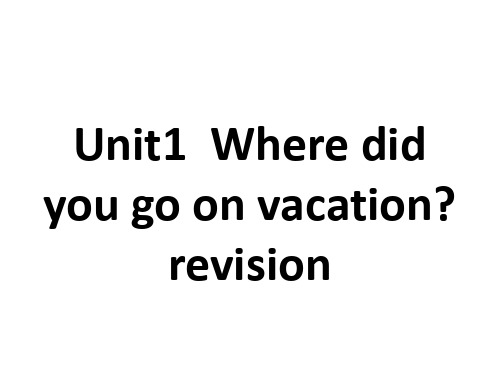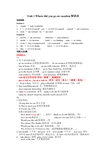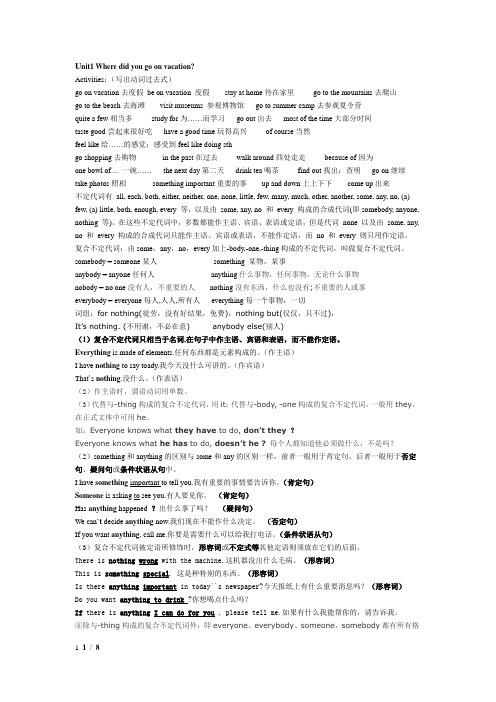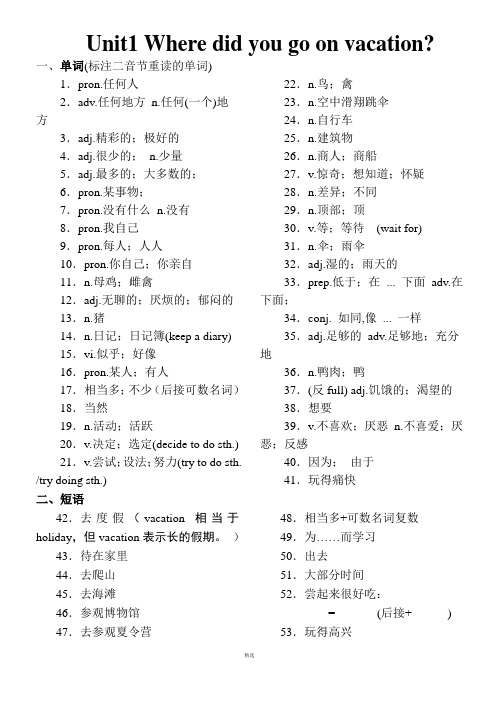Unit 1 Where did you go on vacation Section A 同步练习1
人教版英语八年级上册 Unit 1 Where did you go on vacati

go out 出去
last month 上个月
take photos 拍照
quite a few 相当多;不少
have a good time 玩得开心 go shopping 去购物
of course 当然;自然
seem to do sth. 似乎做某事;好像做某事
keep a diary 写日记
Unit 1 Where did you go on vacation?
单元知识盘点
常用短语
on vacation 度假
go to the mountains 去爬山
stay at home 待在家里 go to the beach 去海滩
summer camp 夏令营
play volleyball 打排球
经典句型
1. ...I bought something for my father. ……我给我爸爸买了一些 东西。
2. Everything tasted really good! 所有的食物尝起来都很美味! 3. How did you like it? 你认为它(三亚)怎么样? 4. It was sunny and hot, so we decided to go to the beach near our
5. |烟台中考|—Look at my new smartphone.
—Wow, it’s so cool. When and where C you
it?
A. do; buy
B. have; bought
C. did; buy
D. have; had
6. —I have seen The Adventures of Alice in Wonderland. What
八年级上册unit1wheredidyougoonvacation课文重难点讲解

Unit 1 Where did you go on vacation ?课文重难点讲解【教师寄语】The reason why a great man is great is that he resolves to be a great man.伟人之所以伟大,是因为他立志要成为伟大的人Section A1. Where did you go on vacation ? 你去哪儿度假?【解析】vacation [və'keɪʃn] n假期= holidayon vacation 在度假take a vacation 去度假winter vacation 寒假summer vacation 暑假①I have a lot of _______________every year . (vacation)( ) ②—Where did Sarah go on vacation? —She went to America.A. on vacationB. take a vacationC. is on vacationD. is for vacation2. Kevin meet anyone interesting?凯文遇到有趣的人了吗?【解析1】someone [sʌmwʌn] pron 某人anyone [eniwʌn] pron任何人everyone [evriwʌn] pron每人,人人【注】不定代词作主语,谓语动词用单数Is everyone here ?Did she go to the park with __________last year? ( someone)【解析2】interest v 使感兴趣→interesting adj. 有兴趣的→interested adj. 感兴趣的be interested in 对……感兴趣The students are __________in these ______books.( interest)【注】以—ing结尾的adj. 常用来作定语或表语,修饰物。
Unit1--Where-did-you-go-on-vacation

The songs sound beautiful.这些歌曲听起来 很优美。
过得高兴,玩得愉快
have a good\great\fun time (=enjoy oneself)
They had a good time yesterday.= They enjoyed themselves yesterday.
find—found找到
2.不定代词和不定副词的用法
some
body
any
one
every thing
no
where(疑问副
词)不定代词和不定副词
(1)左边的some、any、every、no与右 边的body、one、thing构成不定代词, some、any、every、no与右边的疑问副 词where构成不定副词;
2. 回顾一下在3b中所回答的问题的情况,然后 将这些句子按恰当的逻辑顺序排列在一起, 形成条理清晰的一段文字。
3. 可根据旅行经历再加一些恰当想像的句子。 4. 再次,阅读一遍短文,看有没有错误的句
子。
假如你和你的家人在四月八号这天参观了北 京,请你以日记的形式把这天的经历及感受 记录下来。 提示:1. 早上:参观颐和园(爬万寿山;在 昆明湖划船) 2. 中午:吃北京烤鸭 3. 下午: 逛王府井大街 参考词汇:颐和园 the Summer Palace; 万寿山 Longevity Hill;昆明湖Kunming Lake;王府井大街 Wangfujing Street;风 景 scenery
1. 定基调 体裁:应用文(日记);日记的主体部分为 记叙文 时态:谈过去的经历时,用一般过去时。 人称:写个人经历时,用第一人称。
八年级上新人教版Unit1 Where did you go on vacation

八年级上新人教版Unit1 Where did you go on vacation?语言讲解1.Why not +动原+其它?=Why don’t you +动原+其它?为什么不干某事?,Why don’t you play ?=Why not play?, Why didn’t you buy anything for yourself?2.(1)反身代词:myself, yourself, himself, herself, itself, ourselves, yourselves, themselves.(2) by+主语的反身代词,“单独地,独自地”;(3)Why not +动原+其它?=Why don’t you +动原+其它?为什么不干某事?,Why don’t you play ?=Why not play?, Why didn’t you buy anything for yourself? (4)特殊疑问词、不定代词和不可数名词作句子主语,谓语动词按三单。
Everything was excellent.(5) nothing =not anything,(6)keep a diary记日记,3.(1) 不定代词和不定副词定语后放。
不定代词有: something, anything, nothing, everything, someone, anyone, no one, everyone, somebody, anybody, nobody, everybody. 不定副词有: somewhere, anywhere, nowhere, everywhere. 如,something delicious, anything special, Did you go anywhere interesting ?(2)little +不可数,“没一点儿”,a little +不可数,“有一点儿“,few +复数,“没几个”,a few +复数,“有几个”,4.(1)wonder+从句, 从句=引导词+主语+谓语; I wonder what life was like here in the past.(2)because+从句, because of+短语, (3) too many+复数, “太多”; too much+不可数, “太多”; much too+形=too +形,“太”,5.(1) quite a few+复数,”很多”, (2) What about doing…? =How about doing…?干某事怎么样? (3)stay at home to do sth.呆在家干某事. (4)most of time大多数时间,。
Unit 1 Where did you go on vacation 全单元教案

Unit 1 Where did you go on vacation 全单元教案Unit 1 Where did you go on vacationSection A1 (1a―2d)一、教学目标1) 能掌握新单词:anyone, anywhere, wonderful, few, most。
2) 能掌握以下句型:①—Where did you go on vacation —I went to the mountains.②—Where did Tina go on vacation —She went to the beach.③—Did you go with anyone —Yes, I did./No, I didn’t.3) 能掌握语法:复合不定代词someone, anyone, something, anything 等的用法。
4)能掌握一般过去时的特殊疑问句、一般疑问句及其肯定和否定回答。
二、教学重难点1. 教学重点1) 用所学的功能语言交流假期去了什么地方旅行。
2) 掌握本课时出现的新词汇。
2. 教学难点1) 复合不定代词someone, anyone, something, anything等的用法。
2) 一般过去时的特殊疑问句的使用及答语。
三、教学过程1. Lead-in观看有关旅行的动画视频,进入本课时的主题——谈论过去的假期去了什么地方及做了些什么事情。
2. Presentation1)Show some pictures on the big screen. Let students read the expressions.2) Focus attention on the pictures. Ask: What can you see Say: Each picture showswhat a person did in the past. Name each activity and ask students to repeat:stayed at home, went to New York City, visited my uncle, went to summer camp,went to mountains, went to the beach, visited museums.Now, please match each phrase with one of the pictures next to the name of theactivity. Point to the sample answer.Check the answers. Answers: 1. f 2. b 3. g 4. d 5. c 6. a 7. e 3. Listening1) Point to the picture on the screen.Say: Look at the Picture A. Where did Tina go on vacation She went to mountains.Ask: What did the person do in each picture2) Play the recording the first time.3) Play the recording a second time.Say: There are three conversations. The people talk about what they did on vacation. Listen to the recording and write numbers of the names in the right boxes of the picture.4) Check the answers.4. Pair work1) Point out the sample conversation. Ask two students to read the conversation to the class.2) Now work with a partner. Make your own conversation about the people in the picture.3) Students work in pairs. As they talk, move around the classroom and give any help they need.4) Let some pairs act out their conversations.5. ListeningTell students that they will hear a conversation about three people’s talking about their vacations. Listen for the first time and fill in the chart. Then listen again and check Yes or No.1) Let students read the phrases in the chart of 2b.2) Play the recording the first time. Students listen and fill in the chart.3) Play the recording a second time for the students to check “Yes, I did.”or “No, I didn’t. ”4) Check the answers with the students.6. Pair work1) Let two students read the conversation between Grace, Kevin and Julie.2) Let students work in pairs and try to role-play the conversation.3) Ask some pairs to act out their conversations.7. Role-play1) First let students read the conversation and match the people and the places they went to.2) Let students act out the conversations in pairs.3) Some explanations in 2d:Long time no see. anywhere interesting took quite a few photosWhat about... anything special Not really.I just stayed at home most of the time to read and relax.Homework:用英语询问你的一位好朋友,她(他)假期去了哪里?看到了什么?并将此对话写在作业本上。
Unit 1 Where did you go on vacation知识点

Unit 1 Where did you go on vacation知识点词型转换Section A1.wonder →(adj.) wonderful2.I →(反身代词) myself you →(反身代词) yourself yourself →(pl.) yourselves3.seem →(pt.) seemed try →(pt.) triedSection B1.activity →(pl.) activities difference →(adj.) different2.decide →(n.) decision build →(n.) building trade →(n.) trader3.excite→(adj.) exciting/excited →(n.) excitement enjoy→(adj.)enjoyable4.like →(反义词) dislike below →(反义词) above5.bike →(同义词) bicycle词组大归纳Section A1a1.关于活动的词组:go on vacation去度假(强调动作) be on vacation在度假(强调状态)stay at home在家go out with someone 和某人一起出去go to mountains去爬山go to New York City 去纽约城go to the beach去沙滩go to summer camp 去夏令营visit relatives 拜访亲属visit museums 参观博物馆visit还可以作名词“拜访,参观”,构成短语pay a visit to…/be on a visit to…译为“访问(某人)”“参观(某地)”1.keep a diary 写日记play volleyball 打排球of course 当然;自然1. buy something special 买一些特别的东西meet someone interesting 遇见有趣的人2. study for a test/tests 备考study to do sth学习做某事study by oneself =learn by oneself= teach oneself自学2d1.交际用语:1)Long time no see.好久不见2) Nice to meet you.很高兴见到你3) Excuse me.劳驾4)表示建议的几种:How about doing sth?……如何?Shall we do sth?我们能….吗?Let’s do sth.咱们去…. why not +do sth?为什么不做……?Would you like sth?你想要….吗Yes, please./No, thanks.是的,来一点/不,谢谢Would you like to do sth?你想要做…..吗?Yes, I’d love to./ I’d love to, but….是的我愿意/我愿意,但……2. last month 上个月last year 去年next month 下个月next year 明年句中有last+名词出现时用一般过去式,有next +名词出现时用一般将来时。
Unit1 Where did you go on vacation

U nit1 Where did you go on vacation?Activities:(写出动词过去式)go on vacation去度假be on vacation 度假stay at home待在家里go to the mountains去爬山go to the beach去海滩visit museums 参观博物馆go to summer camp去参观夏令营quite a few相当多study for为……而学习go out出去most of the time大部分时间taste good尝起来很好吃have a good time玩得高兴of course当然feel like给……的感觉;感受到feel like doing sthgo shopping去购物in the past在过去walk around四处走走because of因为one bowl of…一碗……the next day第二天drink tea喝茶find out找出;查明go on继续take photos照相something important重要的事up and down上上下下come up出来不定代词有all, each, both, either, neither, one, none, little, few, many, much, other, another, some, any, no, (a) few, (a) little, both, enough, every 等,以及由some, any, no 和every 构成的合成代词(即somebody, anyone, nothing 等)。
在这些不定代词中,多数都能作主语、宾语、表语或定语,但是代词none 以及由some, any, no 和every 构成的合成代词只能作主语、宾语或表语,不能作定语,而no 和every 则只用作定语。
Unit 1 Where did you go on vacation知识点归纳及练习

Unit1 Where did you go on vacation?一、单词(标注二音节重读的单词)1.pron.任何人2.adv.任何地方n.任何(一个)地方3.adj.精彩的;极好的4.adj.很少的;n.少量5.adj.最多的;大多数的;6.pron.某事物;7.pron.没有什么n.没有8.pron.我自己9.pron.每人;人人10.pron.你自己;你亲自11.n.母鸡;雌禽12.adj.无聊的;厌烦的;郁闷的13.n.猪14.n.日记;日记簿(keep a diary)15.vi.似乎;好像16.pron.某人;有人17.相当多;不少(后接可数名词)18.当然19.n.活动;活跃20.v.决定;选定(decide to do sth.)21.v.尝试;设法;努力(try to do sth. /try doing sth.)22.n.鸟;禽23.n.空中滑翔跳伞24.n.自行车25.n.建筑物26.n.商人;商船27.v.惊奇;想知道;怀疑28.n.差异;不同29.n.顶部;顶30.v.等;等待(wait for)31.n.伞;雨伞32.adj.湿的;雨天的33.prep.低于;在... 下面adv.在下面;34.conj. 如同,像... 一样35.adj.足够的adv.足够地;充分地36.n.鸭肉;鸭37.(反full) adj.饥饿的;渴望的38.想要39.v.不喜欢;厌恶n.不喜爱;厌恶;反感40.因为;由于41.玩得痛快二、短语42.去度假(vacation相当于holiday,但vacation表示长的假期。
)43.待在家里44.去爬山45.去海滩46.参观博物馆47.去参观夏令营48.相当多+可数名词复数49.为……而学习50.出去51.大部分时间52.尝起来很好吃:= (后接+ ) 53.玩得高兴54.当然55.给……的感觉;感受到:(后接+ )56.去购物57.在过去58.四处走走59.一碗…… 60.喝茶61.找出;查明62.继续63.去旅行64.照相65.上上下下66.出来;出版三、重点句式1.你买特别的东西了吗?Did you buy ?2.所有的东西尝起来真的很好吃!Everything tasted !3.你去哪里度假了?4.我为爸爸买了一些东西。
- 1、下载文档前请自行甄别文档内容的完整性,平台不提供额外的编辑、内容补充、找答案等附加服务。
- 2、"仅部分预览"的文档,不可在线预览部分如存在完整性等问题,可反馈申请退款(可完整预览的文档不适用该条件!)。
- 3、如文档侵犯您的权益,请联系客服反馈,我们会尽快为您处理(人工客服工作时间:9:00-18:30)。
一、根据句意和首字母提示填空
1. W_________ did you go last Sunday?
2. I went to climb the m_________ with my parents last Wednesday.
3. Jerry went to Beijing on v_________ three days ago.
4. I like s_________ at home and doing nothing.
5. Huangguoshu Waterfall is w_________ ·I like it very much·
二、单项选择
1. is ready now. Let’s go.
A. Everything
B. Something
C. Anything
D. Nothing
2. —Is there in today’s newspaper?
—Sorry, .
A. something new; new nothing
B. new something; new nothing
C. anything new; nothing new
D. new anything; nothing new
3. Did you meet on your trip?
A. interesting someone
B. interesting anyone
C. someone interesting
D. anyone interesting
4. —Did they do yesterday?
—Not really. They just stayed at the hotel and watched TV because of the bad weather.
A. something special
B. nothing special
C. anything special
D. special anything
5. Since is watching TV now, please turn it off.
A. someone
B. anyone
C. everyone
D. no one
三、句型转换
1. Lisa visited the art museum last Sunday. (改为否定句)
Lisa the art museum last Sunday.
2. The Browns went to the beach on vacation. (改为一般疑问句)
the Browns to the beach on vacation?
3. They were busy yesterday. (改为一般疑问句)
they yesterday?
4. Jane studied for exams last night. (对画线部分提问)
Jane last night?
5. John played basketball with his friends yesterday. (对画线部分提问)
John basketball with yesterday?
四、完成句子
1. 我假期参观了历史博物馆。
I the history museum .
2. 在水上公园你们做有趣的事情了吗?
you do in the Water Park?
3. 昨晚你和谁一起去看电影了?
you to the movies with last night?
4. 上周你们城市的天气怎么样?
the weather in your city last week?
5. 昨天在聚会上人人都过得很开心。
Everyone
at the party yesterday.
五、根据情景完成对话(一空一词)
A: 1 did you go on 2 ?
B: I went to Beijing on vacation.
A: Did you 3 a good time there?
B: Yes, I visited the places of interest.
A: Where did you visit?
B: The Great 4 .Summer Palace and so on.
A: 5 did you go there with?
B: My parents. What about you?
A: I was kind of bored. I did my homework all day.
1._________
2. _________
3._________
4._________
5._________。
